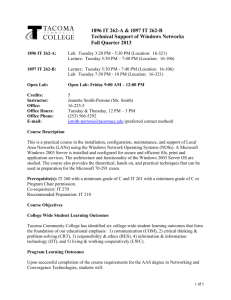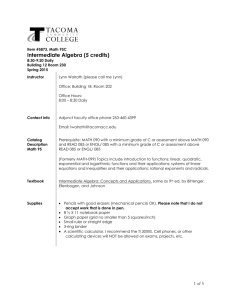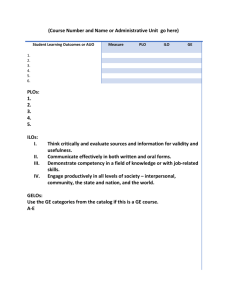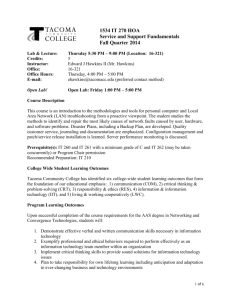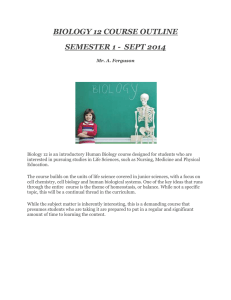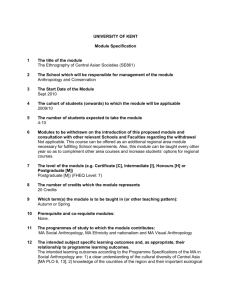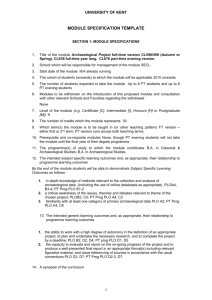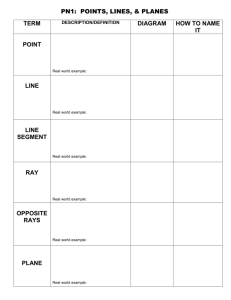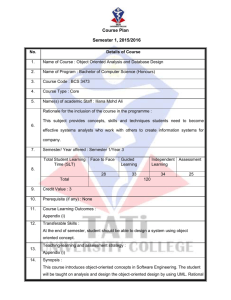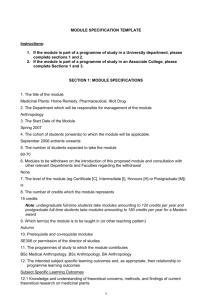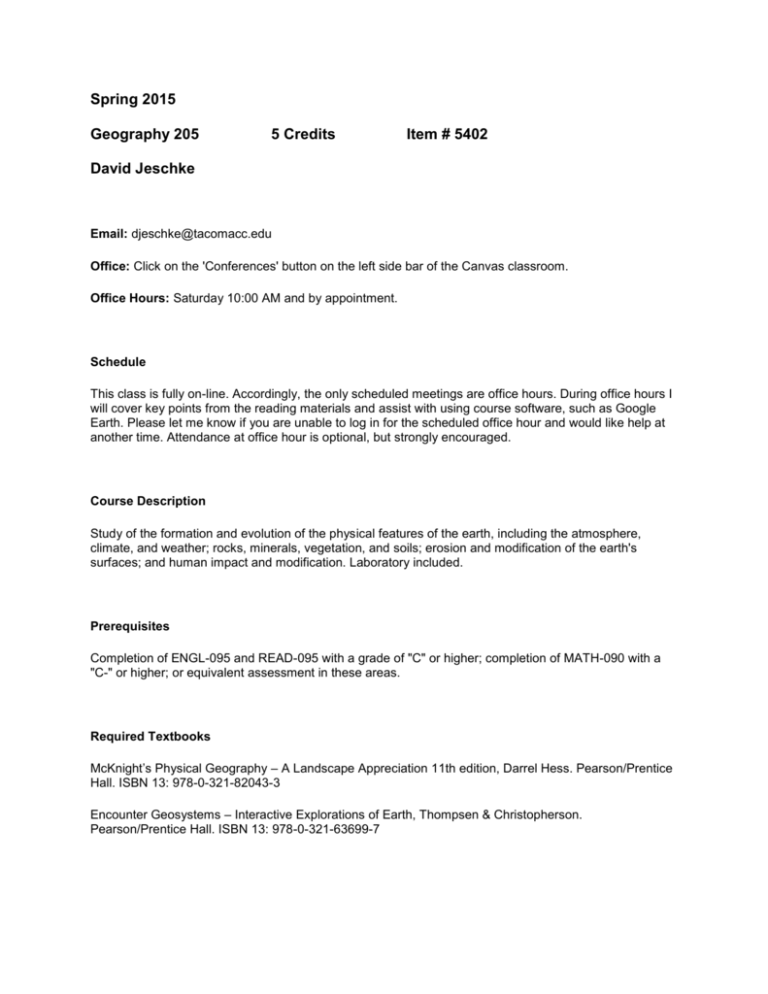
Spring 2015
Geography 205
5 Credits
Item # 5402
David Jeschke
Email: djeschke@tacomacc.edu
Office: Click on the 'Conferences' button on the left side bar of the Canvas classroom.
Office Hours: Saturday 10:00 AM and by appointment.
Schedule
This class is fully on-line. Accordingly, the only scheduled meetings are office hours. During office hours I
will cover key points from the reading materials and assist with using course software, such as Google
Earth. Please let me know if you are unable to log in for the scheduled office hour and would like help at
another time. Attendance at office hour is optional, but strongly encouraged.
Course Description
Study of the formation and evolution of the physical features of the earth, including the atmosphere,
climate, and weather; rocks, minerals, vegetation, and soils; erosion and modification of the earth's
surfaces; and human impact and modification. Laboratory included.
Prerequisites
Completion of ENGL-095 and READ-095 with a grade of "C" or higher; completion of MATH-090 with a
"C-" or higher; or equivalent assessment in these areas.
Required Textbooks
McKnight’s Physical Geography – A Landscape Appreciation 11th edition, Darrel Hess. Pearson/Prentice
Hall. ISBN 13: 978-0-321-82043-3
Encounter Geosystems – Interactive Explorations of Earth, Thompsen & Christopherson.
Pearson/Prentice Hall. ISBN 13: 978-0-321-63699-7
Required Supplies
Scientific calculator
Digital camera (available for checkout at E-learning department)
Metric ruler
Cooking thermometer
Required Software
Eluminate client
Screen capture tool (such as Jing or Snagit - built into Windows 7)
Web browser such as Microsoft Internet Explorer or Mozilla Firefox
Drawing software: Paint or something similar
Text editor such as Word
Assessment
There will be a variety of different assignments, activities, quizzes, and tests in this course. Each is
described below. At the end of the quarter all points earned will be added up, and a percentage of the
total possible points calculated. Your final grade for the course will be determined by this percentage
according to the table below. Due dates are provided for each item assigned. These are to help you judge
if you are keeping pace. Late assignments, quizzes and lab exercises are accepted up to two weeks
following a due date. No work will be accepted after this unless prior arrangements have been made.
Examinations must be completed on the date(s) indicated.
Reading Review Assignments
There will be a set of ten questions covering the assigned readings each week of the quarter. This is an
open-book, open-note assignment, and has no time limit. There will be 10 of these assignments, and
each is worth 10 points toward your grade.
Quizzes
Each week there will be a timed quiz that covers material from the assigned readings. These will consist
of 10 questions each. You will be allowed 10 minutes to complete the quiz once you have begun. The
quizzes are open-book and open-note. There will be a total of 10 quizzes and each will be worth 10 points
toward your grade.
Google Earth Activities
There will be 8 chapters assigned from your book "Encounter Geosystems: Interactive Explorations of
Earth using Google Earth". One of these will be done each week through week 8 of the quarter. Particular
questions from each chapter have been selected for you to submit written answers to. Each set of written
answers will be worth 10 points toward your grade.
Google Earth Capstone Project
In weeks 9 and 10 of the quarter you will develop a narrated tour of a landform using Google Earth. You
will save this as a .kmz file (instructions will be provided) and turn this file in for credit. This project will be
worth 20 points toward your grade.
News Item Postings and Summaries
Each week you will find a news item in the popular media that concerns a topic we are studying. You will
post a link to this news item along with a brief summary in your own words. After the class has posted
these each week, you will write a response to one of your classmate’s news postings. There will be a total
of 10 of these summaries, and each will be worth 10 points toward your grade.
Laboratory Exercises and Field Activities
There will be 9 laboratories or activities for you can complete at home or in the field. These will cover a
variety of topics including map basics, heat energy, and stream patterns viewed in Google Earth. Each of
these will be worth 10 points toward your grade.
Examinations
Weather and Climate Examination: There will be an examination covering the weather and climate
chapters of your textbook. This date of the exam will be announced, and it will be worth 30 points toward
your grade.
Landforms Examination: There will be an examination covering the landform chapters included in this
course. This date of the exam will be announced, and it will be worth 30 points toward your grade.
Final Examination: There will be a final examination that covers all material covered in this course. This
exam must be taken in person. I will arrange for a computer equipped classroom during finals week for
this exam, the date time and room number will be announced. If you cannot make this scheduled exam
you may take it at the TCC testing center during finals week. It is your responsibility to schedule a time
with the testing center to take this exam. This exam will be worth 50 points toward your grade.
Extra Credit
You may write short research papers for extra credit if you wish to. Each paper must be a minimum of 800
words in length, and must include at least two citations of your research material. These sources must be
reputable scientific journals, or academic websites. (Your textbook does not count as a source of
research material.) You may submit up to 2 of these research papers. These papers can earn you as
much as 20 points of extra credit each.
Grade
There are a total of 600 points possible in this course. Your final grade will be determined by the
percentage of these 600 you have earned according to this table:
Grade
A
AB+
B
BC+
%
95.0
92.0
89.0
86.0
83.0
80.0
Grade
C
CD+
D
E
%
77.0
73.0
69.0
65.0
<65.0
Academic Dishonesty
Cheating and plagiarism will not be tolerated. You will receive no credit for the work in question, no
second chance, and may be subject to further disciplinary action including removal from the class.
Students with Special Needs
All students are responsible for all requirements of the class, but the way they meet these requirements
may vary. If you need specific auxiliary aids or services due to a disability, please contact the Access
Services office in Building 7 (253-566-5328). They will require you to present formal, written
documentation of your disability from an appropriate professional. When this step has been completed,
arrangements will be made for you to receive reasonable auxiliary aids or services. The disability
accommodation documentation prepared by Access Services must be given to me before the
accommodation is needed so that appropriate arrangements can be made.
Etiquette for Classroom Dispute Resolution
If you have questions or concerns about this class or me, please talk with me about your concerns. If we
are unable to resolve your concerns, you may talk next with the Chair of the Department, Dr. Ralph Hitz,
room #29-234. The Chair can assist with information about additional steps, if needed.
Course Polcies
Late work will not be accepted after the two week grace period. Nothing will be accepted after
the last day of finals week.
If you decide to drop the class you must officially withdraw. If you are on the class roster at the
end of the quarter without sufficient points to pass you will receive a failing grade on your
permanent transcript.
Written work will be graded on spelling, grammar, clarity, and all-around good writing skills.
These will be ~20% of the score. The other 80% will be for the geographical content.
No incomplete grades will be given. Course work must be completed during the quarter as
scheduled.
Caveats
This syllabus and schedule are subject to change in the event of extenuating circumstances. If you are
absent from class, it is your responsibility to check for announcements made while you were absent.
College Wide Student Learning Outcomes
Tacoma Community College has identified six college-wide student learning outcomes that form the
foundation of our educational emphasis: 1) communication (COM), 2) critical thinking & problem-solving
(CRT), 3) responsibility & ethics (RSP), 4) information & information technology (IIT), 5) living & working
cooperatively (LWC), and 6) core of knowledge (COK).
These are the specific outcomes for Geography 205. PLO represents Program Learning
Outcomes for the Science disciplines, which may be found in the TCC catalog at this location:
http://www.tacomacc.edu/catalog/11-12catalog/. Each outcome may or may not relate to one or
more of the Science PLOs.
1. Demonstrate through map use, the introductory principles of cartography and map
symbolization.
2. Explore how geographic information systems work by using simple systems and discussing
the uses of more complex systems.
PLO: 3,
3. Describe the structure and physics of the atmosphere.
PLO: 2,
4. Explain the broad characteristics of the global climate system and how those patterns generate
regional weather. Execute simple analyses of weather data.
PLO: 1, 2,
5. Describe the basic biosphere and vegetation patterns.
PLO: 2,
6. Describe the structure of the earth and explain how it relates to the processes of plate
tectonics.
PLO: 2,
7. Describe the characteristics and origin of the major classes of rocks and minerals and classify
rock samples.
PLO: 2,
8. Explain common weathering processes and how they lead to mass wasting. Determine patterns
of local landslide susceptibility and make recommendations to mitigate these risks.
PLO: 2,
9. Describe basic soil diversity and genesis. Carry out basic soil profile descriptions in the field.
Describe soil erosion and misuse and recommend soil conservation measures.
PLO: 2, 3,
10. Explain the fundamentals of the hydrosphere and river systems. Attribute local stream
drainage patterns to the controlling geologic and geographic variables.
PLO: 2,
11. Describe the fundamentals of glaciology and the erosional and depositional patterns
produced by glacial action. Explain the dominant effect of glacial process on the local Puget
Sound landscapes. Recognize the effects of glaciers in map imagery.
PLO: 2,
12. Describe the fundamental aspects of arid landscapes.
PLO: 2,
13. Describe the fundamentals of coastal processes. Critique regional coastal land-use patterns
with respect to the physical stability of our coasts and their ecological integrity.
PLO: 2,
14. Cite examples of human impacts on the earth.

